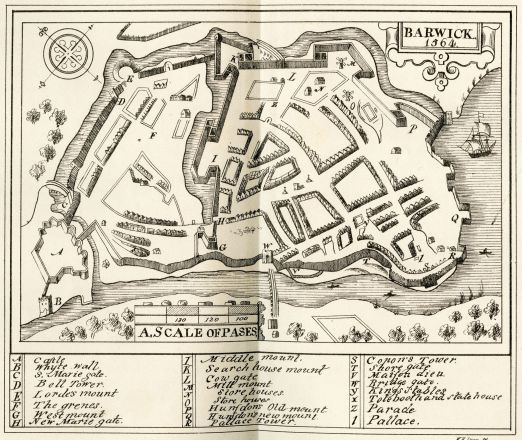
During Elizabeth I’s reign Berwick was heavily fortified to protect it against possible future attacks. This map from 1564 shows the castle, rampart walls and barracks. According to sources over £120,000 was spent on the fortifications, many of which remain today. If true this would make it the most expensive undertaking of the Elizabethan period, amounting to over £25,000,000 of expenditure in today’s money.
In April 1318, Berwick-upon-Tweed was captured by the Scottish in the First War of Scottish Independence. Following the Scottish victory at the Battle of Bannockburn in 1314, they regained all of their strongholds and re-taking Berwick was the culmination of this. The Scots however, could not hold the town and it was soon re-captured by the English. In fact over a period of almost 400 years from the late 10th century the town changed hands more than a dozen times.
Its strategic position on the border during many years of English/Scottish war, coupled with the fact that it was a wealthy trade town, meant Berwick was constantly under siege between the 11th and 15th centuries. Part of Northumbria and thus England until the late 10th century, the town came under Scottish control (whether by cession or conquest is unclear) and was made a Royal Burgh by David I. William I of Scotland used Berwick as a stage from which to invade northern England in 1173 and following his defeat the town fell back under the English control of Henry II. However, his son Richard I sold it back to William I in order to raise funds for his crusade.
The 13th century saw much battling and bargaining for the increasingly prosperous town. William Wallace’s severed arm was displayed in Berwick following his execution and quartering in 1305. After the Scots triumphed over the English at the Battle of Bannockburn, they blockaded the town between 1315 and 1318 finally invading and capturing it in April 1318. The English took it back in 1333 and held it until 1461 when deposed King Henry VI’s wife Margaret of Anjou gifted it to the Scots for their help against the Yorkists during the Wars of the Roses. Finally in 1482, Richard, Duke of Gloucester (and soon-to-be King Richard III) recaptured the town and Berwick has been English ever since.
